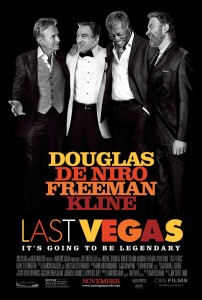 Movie comfort food, no more, no less, Last Vegas unites a quartet of Oscar-winning actors who so far as I can tell have never appeared together in any other movie, in any combination. In a different age, these four men, all at, near, or over age 70, would have rode off into the sunset in a classic Western, say, Sam Peckinpah’s Ride the High Country (1962) or The Wild Bunch (1969), or Richard Brooks’ The Professionals (1966), or Howard Hawks’ El Dorado (1967), all featuring prime talents past their peak years. In our time, they have to make do with a generic old age comedy advertised as a geezer gloss on The Hangover.
Movie comfort food, no more, no less, Last Vegas unites a quartet of Oscar-winning actors who so far as I can tell have never appeared together in any other movie, in any combination. In a different age, these four men, all at, near, or over age 70, would have rode off into the sunset in a classic Western, say, Sam Peckinpah’s Ride the High Country (1962) or The Wild Bunch (1969), or Richard Brooks’ The Professionals (1966), or Howard Hawks’ El Dorado (1967), all featuring prime talents past their peak years. In our time, they have to make do with a generic old age comedy advertised as a geezer gloss on The Hangover.
That it isn’t (the PG-13 rating, allowing for “pricks” and “assholes” in the dialogue but not on camera, sees to that). Last Vegas is more in the find-your-smile vein of City Slickers (1991), as old men in various states of grumpiness recharge. The “Flatbush Four,” who terrorized Brooklyn bullies twice their size in the 50s, are revisited 50 years later in the winters of their discontent. Disturbed by the death of his business partner, Billy (Michael Douglas), a well-to-do businessman relocated to Malibu, impulsively decides to wed his 31-year-old girlfriend. Sam (Kevin Kline), retired and adrift in Florida, and Archie (Morgan Freeman), whose overprotective son keeps him on a tight leash following a mild stroke, decide to throw him a bachelor party in Sin City. The stumbling block is Paddy (Robert De Niro), a grouchy widower, who has unfinished business with Billy regarding his deceased wife. Ben and Archie get Paddy to change his mind if not his heart, and the fun, rarely more than mild but agreeable nonetheless, begins.
Let’s face it–a movie directed by Jon Turteltaub (Phenomenon, National Treasure) and written by Dan Fogelman (Fred Claus, The Guilt Trip) was always going to be as formulaic as baby’s bottle. There are no sharp turns or edges here and abundant product plugs for the Aria Hotel, where the main action takes place. After the Emmy-winning shock of Liberace in the Vegas-set Behind the Candelabra, Douglas mostly reprises his usual horndog sharpie, while De Niro, who has been playing sour apples to comic effect since the excellent Midnight Run (1988), sticks to that template. Hemmed in by the depthless material, neither convinces as frenemies. Shaking them up as best she can is another Oscar winner, Mary Steenburgen, who poses another unexpected romantic challenge as wedding bells begin to peal for a suddenly, and understandably, reluctant Billy. Reviving fond memories of her turn in Melvin and Howard (1980), Steenburgen’s no-nonsense, seen-it-all lounge singer steals the movie from the guys. Kline and Freeman pretty much play backup. (And play it well, getting most of the laughs and the pathos. Of course Freeman has a “Freeman scene,” where he launches into a tough love speech, but no one has a Freeman scene like Freeman, and the audience claps in approval, again. Theatre buffs, meanwhile, will be delighted to see Joanna Gleason as Kline’s wife in bookending scenes, the closest the film comes to a grace note if you admire the heavier lifting they do onstage.)
I’m not sure what else there is to say. With jokes about age and boobs and medication and staying up past one’s bedtime, movies like Last Vegas defeat higher meaning and purpose; that’s what they’re intended to do. With veteran stars like Sean Connery and Gene Hackman retired, and Freeman’s Bucket List co-star Jack Nicholson on the fence about returning to work, I’m glad this foursome had something to do other than play golf. But let’s hope that what happened in Last Vegas stays in Vegas, and that they look for greater challenges elsewhere.
[youtube width=”602″ height=”350″ video_id=”IMnr-R7BkkU”]




Comments